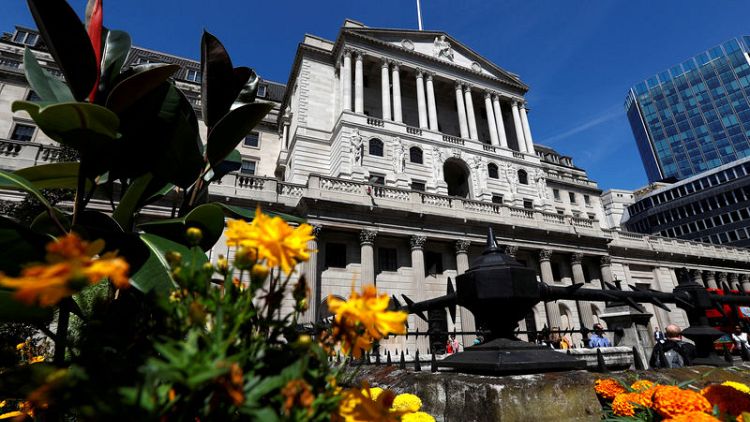By David Milliken
LONDON (Reuters) - Britain's central bank is expected to keep interest rates steady on Thursday, after a Halloween policy meeting which economists said would leave long-term plans to raise borrowing costs in "suspended animation".
Rather than zombie companies or supernatural forces, it is the more familiar bogeyman of an economically damaging no-deal Brexit which is almost certain to keep the Bank of England on hold after its last interest rate rise three months ago.
"Until a deal is done - or not - we suspect the BoE is in suspended animation," Bank of America Merrill Lynch economist Robert Wood wrote in a note to clients.
A year ago the BoE raised interest rates for the first time since the global financial crisis and followed this with a further rise in borrowing costs to 0.75 percent in August.
Economists polled by Reuters expect the nine members of the BoE's Monetary Policy Committee to have voted unanimously to keep rates on hold this month, and on average do not see a further rate rise until May.
Britain is due to leave the European Union on March 29 next year, but Prime Minister Theresa May has yet to secure a transitional deal that will ensure goods and people can continue to move freely between Britain and the EU the day after.
The pound's fall against the dollar and the euro after June 2016's Brexit vote pushed inflation to a near six-year high of 3.1 percent last year.
The effects of this are now fading, and inflation dropped to 2.4 percent in September. But some BoE policymakers are concerned that a pick-up in wage growth this year will delay inflation's return to its 2 percent target.
Stripping out volatile bonuses, annual pay growth in the three months to August rose to 3.1 percent, its biggest rise since January 2009, prompting BoE chief economist Andy Haldane to talk of a "new dawn" for pay growth.
Other officials, such as deputy governor Jon Cunliffe, are more sceptical, and recent consumer data has shown slower spending after a summer splurge which was driven by unusually warm weather.
The BoE will update its growth and inflation forecasts on Thursday. Some economists expect the inflation forecast to come in a fraction closer to 2 percent than in August, as a stronger currency and higher global interest rates offset the inflationary potential of higher wages.
Growth for this year was forecast at a lacklustre 1.4 percent in August - due to heavy snow hitting the economy at the start of the year, and the BoE is likely to stick with predictions of a pick-up in 2019, assuming Brexit goes smoothly.
BoE Governor Mark Carney said in August that market expectations of about one 25 basis point rate rise a year was a good rule of thumb for households, and economists see no shift from this broad approach on Thursday.
"As we approach the endgame for (Brexit transition) talks, we do not expect the BoE to make changes to its guidance," Bank of America's Wood said.
(Reporting by David Milliken; Editing by Hugh Lawson)



